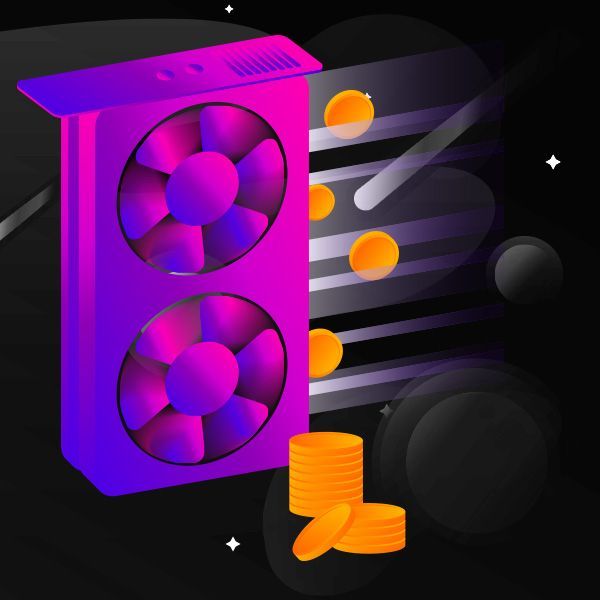Crypto Terms:
Letter S
What is Storage (Decentralized)?
Meaning:
Storage (Decentralized) -
Decentralized storage is the idea of putting documents online by dividing them into encrypted fragments and delegating these fragments to multiple nodes on a distributed network.
Let's find out Storage (Decentralized) meaning, definition in crypto, what is Storage (Decentralized), and all other detailed facts.
The concept of decentralized storage entails splitting documents into encrypted fragments and delegating these fragments to multiple nodes on a distributed network. The servers are managed by people, instead of organizations. This gives it the ability to limit access to certain users and censor specific data. Users that engage in decentralized storage are perceived as trustworthy through smart contracts and they are encouraged by receiving tokens as rewards.
The idea of decentralized storage was created back in 2013-2015 by projects such as IPFS, Stroj, and Siacoin. The goal was to leverage the advantages associated with decentralized networks in order to improve privacy, security, censorship resistance, cost, and availability of storage systems.
The following are the main advantages of decentralized storage systems:
- Enhanced censorship due to the fact that there is no one body in charge of the network.
- Increased safety and confidentiality due to the deployment of alternative replicas of file fragments. Even if some network nodes get corrupted, data may still be recovered from the other nodes.
- Increased uptime since data download is possible from various network nodes, the majority of which are available at any time.
However, cloud storage, which is the remote storage of documents on servers managed by service suppliers (such as Google Drive or Amazon Drive) should not be confused with decentralized storage.
The information repositories of cloud storage providers are centralized, which means they might undergo outages or be targeted by cybercriminals. This results in poorer accessibility or even destruction of stored data. Besides, they are maintained by private organizations that tend to filter data and limit access to individual clients.
cryptocurrency miners<\/strong><\/a> who provide <a href=https://www.bitdegree.org/"//crypto//learn//crypto-terms//what-is-node/">nodes with enough storage to validate transactions and reach <a href=https://www.bitdegree.org/"//crypto//learn//crypto-terms//what-is-consensus/">consensus. They do that because storage mining enables miners to earn money by simply storing data. To become a node of the blockchain network, a miner must dedicate a particular quantity of its <a href=https://www.bitdegree.org/"//crypto//learn//crypto-terms//what-is-storage-decentralized/">storage space. Storage miners have the option of dedicating either cloud storage or hardware storage. This makes acquiring additional storage power and moving up the node rankings extremely <strong>simple<\/strong>.<\/p>\n<p>Filecoin (FIL) is one of the most well-known <a href=https://www.bitdegree.org/"//crypto//learn//crypto-terms//what-is-cryptocurrency/">cryptocurrencies that rely on storage mining for its operations. In order to choose suitable nodes, the Filecoin blockchain relies on the storage capacity of its miners. These nodes then operate as transaction verifiers and miners for newly added <a href=https://www.bitdegree.org/"//crypto//learn//crypto-terms//what-is-block/">blocks to the chain. Validators for nodes are chosen <strong>based on the amount of storage capacity they can provide<\/strong> to the network. For successful block creation in Filecoin, storage miners win FIL tokens.<\/p>\n<p>Members of the Filecoin blockchain <strong>use the storage<\/strong> that miners contribute to the network. That’s the reason why the consensus method requires all approved notes to demonstrate that they have the necessary storage capacity and that they always keep an up-to-date copy of the entire system on their servers.<\/p>\n<p>Though it is not a common thing in the crypto world to entrust the node-selection process to a consensus method based on storage. Well-known blockchains usually rely on <a href=https://www.bitdegree.org/"//crypto//learn//crypto-terms//what-is-proof-of-stake-pos/">Proof-of-Stake (PoS)<\/strong><\/strong><\/a> or <a href=https://www.bitdegree.org/"//crypto//learn//crypto-terms//what-is-proof-of-work-pow/">Proof-of-Work (PoW)<\/strong><\/a> consensus methods.<\/p>\n<p>Even though storage-based consensus mechanisms are rarely used in the blockchain sector, <strong>Filecoin is proof that they actually work<\/strong>. Besides, the criteria for the type of storage power requested by the network is customizable, which provides great flexibility for storage miners. More established consensus mechanisms do not usually allow such flexibility in node requirements.<\/p>","definition":"crypto miners that rely on providing enough storage for nodes to validate transactions and establish consensus.","status":"published","meta_title":"What are Storage Miners? Definition & Meaning | Crypto Wiki","meta_description":"Storage Miners meaning: Storage Miners - crypto miners that rely on providing enough storage for nodes to validate transactions and establish consensus.","meta_keywords":null}"
:prev-section="{"id":739,"wikipedia_url":"https:\/\/en.wikipedia.org\/wiki\/Order_(exchange)#Stop_orders","level":"medium","author_id":1,"created_at":"2023-06-19T06:59:00.000000Z","updated_at":"2023-10-30T04:20:33.000000Z","slug":"what-is-stop-loss-order","title":"What is Stop-Loss Order?","section":"S","keyword":"Stop-Loss Order","content":"<p><strong>Stop-Loss Order, also known as a stop order, is an order to buy or sell an asset that’s triggered when the minimum trading price has been reached.<\/strong> It minimizes the risks by allowing investors to limit their losses.<\/p>\n<p>Cryptocurrencies can be especially volatile, but there are also other financial securities that experience price fluctuations. Since it’s quite a common occurrence, you can see stop-loss orders on various <a href=https://www.bitdegree.org/"//crypto//learn//crypto-terms//what-is-exchange/">exchanges. /nHow Do Stop-Loss Orders Work?<\/h2>\n<p>Firstly, traders have to set the lowest price they’re willing to sell their assets for. This way, the exchange will be able to trigger a sell order in case this set price is reached. By triggering a sell order, the exchange ensures that the trader experiences minimal losses.<\/p>\n<h2>What are the Advantages of Utilizing Stop-Loss Orders?<\/h2>\n<p>Stop-loss orders enable traders to <strong>automate the investing process by eliminating the need to monitor the market at all times of the day<\/strong>. Even if there is a <a href=https://www.bitdegree.org/"//crypto//learn//crypto-terms//what-is-bear/">bearish outlook on the market within the community, the investor can feel secure that they’re not losing significant amounts of money. <\/p>\n<p>Moreover, traders who set up stop-loss orders have the opportunity to make a profit by setting a price at a higher level than the one the asset was purchased at.<\/p>\n<p>When it comes to the crypto sector, it’s well-known that cryptocurrency markets experience high volatility. Because of this, <strong>stop-loss orders can be especially useful within these markets<\/strong>. <\/p>\n<p>For example, placing stop-loss orders at higher prices than what they were initially purchased for. This way traders still get some profit back, even in the case of decreasing token prices. <\/p>\n<p>Stop-loss orders became quite popular in the middle of 2021. This happened because both <a href=https://www.bitdegree.org/"https:////www.bitdegree.org//crypto//buy-bitcoin-btc/">Bitcoin and <a href=https://www.bitdegree.org/"https:////www.bitdegree.org//crypto//buy-ethereum-eth/">Ethereum markets started going on a downward trajectory.<\/p>\n<p>As mentioned above, <strong>stop-loss orders are capable of minimizing the trader’s losses<\/strong>. It’s done by setting up this type of order at a specific price that still gives you some leeway to make a profit. So it’s really no wonder that crypto enthusiasts turn to stop-loss orders to prevent any possibility of losing large amounts of money.<\/p>\n<p> <\/p>","definition":"an investing tool that allows investors to set a minimum trading price that triggers an order when it\u2019s reached.","status":"published","meta_title":"What is Stop-Loss Order? Definition & Meaning | Crypto Wiki","meta_description":"Stop-Loss Order meaning: Stop-Loss Order - is an investing tool that allows investors to set a minimum trading price that triggers an order when it\u2019s reached.","meta_keywords":null}"
:model="{"id":717,"wikipedia_url":"https:\/\/en.wikipedia.org\/wiki\/Data_storage","level":"easy","author_id":1,"created_at":"2023-06-19T06:59:00.000000Z","updated_at":"2023-10-30T04:21:15.000000Z","slug":"what-is-storage-decentralized","title":"What is Storage (Decentralized)?","section":"S","keyword":"Storage (Decentralized)","content":"<p>The concept of <strong>decentralized storage<\/strong> entails splitting documents into encrypted fragments and delegating these fragments to multiple <a href=https://www.bitdegree.org/"//crypto//learn//crypto-terms//what-is-node/">nodes on a distributed network. The servers are managed by people,<strong> instead of organizations.<\/strong> This gives it the ability to limit access to certain users and censor specific data. Users that engage in decentralized storage are perceived as trustworthy through <a href=https://www.bitdegree.org/"//crypto//learn//crypto-terms//what-is-smart-contract/">smart contracts<\/strong><\/a> and they are encouraged by receiving <a href=https://www.bitdegree.org/"//crypto//learn//crypto-terms//what-is-token/">tokens as rewards.<\/p>\n<p>The idea of decentralized storage was created back in 2013-2015 by projects such as <a href=https://www.bitdegree.org/"//crypto//learn//crypto-terms//what-is-interplanetary-file-system-ipfs/">IPFS, Stroj, and Siacoin. The goal was to leverage the advantages associated with decentralized networks in order to improve privacy, security, <strong>censorship resistance<\/strong>, cost, and availability of storage systems.<\/p>\n<p>The following are the main advantages of decentralized storage systems:<\/p>\n<ul>\n<li>Enhanced censorship due to the fact that there is no <strong>one body<\/strong> in charge of the network.<\/li>\n<li>Increased safety and confidentiality due to the deployment of alternative replicas of file fragments. Even if some network nodes get corrupted, data may still be recovered from the other nodes.<\/li>\n<li>Increased uptime since data download is possible from various network nodes, the majority of which are <strong>available at any time<\/strong>.<\/li>\n<\/ul>\n<p>However, cloud storage, which is the remote storage of documents on servers managed by service suppliers (such as Google Drive or Amazon Drive) should not be confused with <strong>decentralized storage<\/strong>.<\/p>\n<p>The information repositories of cloud storage providers are centralized, which means they might undergo outages or be <strong>targeted by cybercriminals<\/strong>. This results in poorer accessibility or even destruction of stored data. Besides, they are maintained by private organizations that tend to filter data and limit access to individual clients.<\/p>","definition":"Decentralized storage is the idea of putting documents online by dividing them into encrypted fragments and delegating these fragments to multiple nodes on a distributed network.","status":"published","meta_title":"What is Storage (Decentralized)? Definition & Meaning | Crypto Wiki","meta_description":"Storage (Decentralized) meaning: Storage (Decentralized) - Decentralized storage is the idea of putting documents online by dividing them into encrypted fragments and delegating these fragments to multiple nodes on a distributed network.","meta_keywords":null,"author":{"id":1,"user_id":1,"created_at":"2023-05-03T14:30:55.000000Z","updated_at":"2023-05-11T07:18:20.000000Z","title":"Editor-In-Chief","slug":"aaron-s-editor-in-chief","description":"<p>Having completed a Master’s degree on Economics, Politics & Culture for the East Asia region, Aaron has written scientific papers with a comparative analysis of the differences between US’ Western and Japan’s Collective forms of capitalism, 1945-2020.<\/p>\n<p>With close to a decade of experience in the FinTech industry, Aaron understands all of the biggest issues and struggles that crypto enthusiasts face. He’s a passionate analyst who is concerned with data-driven and fact-based content, as well as that which speaks to both Web3 natives and industry newcomers.<\/p>\n<p>Aaron is the go-to person for everything and anything related to digital currencies. With a huge passion for blockchain & Web3 education, Aaron strives to transform the space as we know it, and make it more approachable to complete beginners.<\/p>\n<p>Aaron has been quoted by multiple established outlets, and is a published author himself. Even during his free time, he enjoys researching the market trends, and looking for the next supernova.<\/p>","user":{"id":1,"first_name":"Aaron","last_name":"S.","email":"aaron@bitdegree.org","email_sanitized":"aaron@bitdegree.org","email_verified_at":"2023-12-01T09:40:20.000000Z","must_verify_email":false,"is_registered_with_wallet":false,"status":"active","country":"LT","last_connected_ip":"88.119.132.125","image_id":2641,"referral_token":"05TMu2NysXOCn525","referred_by":null,"created_at":"2023-05-03T14:30:55.000000Z","updated_at":"2024-01-09T15:22:21.000000Z","full_name":"Aaron S."}}}"
:chapter-list="[{"id":1,"title":"Blockchain","slug":"blockchain","updated":null,"chapter":"crypto\/assets\/crypto-book\/chapters\/learn-blockchain.jpg","chapter_simple":"crypto\/assets\/crypto-book\/chapters-simple\/blockchain-101.jpg","rating":100,"sections":[{"chapter_id":1,"order":1,"slug":"what-is-blockchain","title":"What is the Blockchain?","status":"published","modified_content":null},{"chapter_id":1,"order":2,"slug":"decentralized-blockchain","title":"Anonymous & Decentralized Blockchains: The Cornerstone of Crypto","status":"published","modified_content":null},{"chapter_id":1,"order":3,"slug":"blockchain-transaction","title":"What is a Blockchain Transaction in Crypto?","status":"published","modified_content":null},{"chapter_id":1,"order":4,"slug":"crypto-fees","title":"The Different Types of Crypto Fees Explained","status":"published","modified_content":null},{"chapter_id":1,"order":5,"slug":"what-is-bridging-in-crypto","title":"The Key Notion Behind the Concept of Bridging in Crypto","status":"published","modified_content":null},{"chapter_id":1,"order":6,"slug":"types-of-blockchains","title":"Different Types of Blockchains: What to Look Out For?","status":"published","modified_content":null}]},{"id":2,"title":"Cryptocurrencies","slug":"cryptocurrencies","updated":null,"chapter":"crypto\/assets\/crypto-book\/chapters\/learn-cryptocurrencies.jpg","chapter_simple":"crypto\/assets\/crypto-book\/chapters-simple\/cryptocurrencies-101.jpg","rating":100,"sections":[{"chapter_id":2,"order":1,"slug":"what-is-a-cryptocurrency","title":"What is a Cryptocurrency?","status":"published","modified_content":null},{"chapter_id":2,"order":2,"slug":"how-does-cryptocurrency-work","title":"How Does Cryptocurrency Work?","status":"published","modified_content":null},{"chapter_id":2,"order":3,"slug":"is-cryptocurrency-a-good-investment","title":"Is Cryptocurrency a Good Investment? The Pros & Cons","status":"published","modified_content":null},{"chapter_id":2,"order":4,"slug":"coin-vs-token","title":"Coin VS Token: How Do They Differ?","status":"published","modified_content":null},{"chapter_id":2,"order":5,"slug":"what-are-stablecoins","title":"What are Stablecoins, Altcoins & Wrapped Coins?","status":"published","modified_content":null},{"chapter_id":2,"order":6,"slug":"what-is-a-bitcoin","title":"Bitcoin: the Pioneer of the Crypto World","status":"published","modified_content":null},{"chapter_id":2,"order":7,"slug":"what-is-ethereum","title":"The Ultimate Blockchain for dApp Creation: Ethereum","status":"published","modified_content":null},{"chapter_id":2,"order":8,"slug":"what-is-cardano-in-crypto","title":"What is Cardano and What is It Used For?","status":"published","modified_content":null},{"chapter_id":2,"order":9,"slug":"what-is-shiba-inu-coin","title":"Shiba Inu: the Dogecoin Killer","status":"published","modified_content":null},{"chapter_id":2,"order":10,"slug":"what-is-solana-in-crypto","title":"Is Solana an Improved Version of Ethereum?","status":"published","modified_content":null},{"chapter_id":2,"order":11,"slug":"what-is-polkadot-in-crypto","title":"The Bridge Between Blockchains: Polkadot","status":"published","modified_content":null},{"chapter_id":2,"order":12,"slug":"what-is-polygon-in-crypto","title":"Polygon: the Essential Scaling Solution for Ethereum","status":"published","modified_content":null},{"chapter_id":2,"order":13,"slug":"what-is-luna-crypto","title":"The Bumpy Road of Terra (LUNA)","status":"published","modified_content":null},{"chapter_id":2,"order":14,"slug":"what-is-fantom-crypto","title":"Is Fantom (FTM) Yet Another Ethereum Killer?","status":"published","modified_content":null},{"chapter_id":2,"order":15,"slug":"what-is-aave-crypto","title":"Aave: Crypto Lending Trailblazer","status":"published","modified_content":null},{"chapter_id":2,"order":16,"slug":"what-is-algorand-crypto","title":"Did Algorand Truly Solve the Blockchain Trilemma?","status":"published","modified_content":null},{"chapter_id":2,"order":17,"slug":"what-is-olympus-dao","title":"Does Olympus DAO Have Anything to Do With Mythology?","status":"published","modified_content":null},{"chapter_id":2,"order":18,"slug":"what-is-avax","title":"Is Avalanche Network (AVAX) Rightfully Called the Future of DeFi?","status":"published","modified_content":null},{"chapter_id":2,"order":19,"slug":"what-is-monero-coin","title":"Monero: Where Cryptocurrency Meets Cryptography","status":"published","modified_content":null},{"chapter_id":2,"order":20,"slug":"what-is-ripple-xrp","title":"Is Ripple \"it\" When it Comes to Cross-Border Transactions?","status":"published","modified_content":null},{"chapter_id":2,"order":21,"slug":"practical-use-of-cryptocurrencies","title":"The Practical Use of Crypto","status":"published","modified_content":null}]},{"id":3,"title":"Crypto Exchanges","slug":"crypto-exchanges","updated":null,"chapter":"crypto\/assets\/crypto-book\/chapters\/learn-crypto-exchanges.jpg","chapter_simple":"crypto\/assets\/crypto-book\/chapters-simple\/crypto-exchanges-101.jpg","rating":80,"sections":[{"chapter_id":3,"order":1,"slug":"how-do-cryptocurrency-exchanges-work","title":"How do Cryptocurrency Exchanges Work?","status":"published","modified_content":null},{"chapter_id":3,"order":2,"slug":"dex-vs-cex","title":"DEX VS CEX: Two Sides of the Crypto Exchange Industry","status":"published","modified_content":null},{"chapter_id":3,"order":3,"slug":"crypto-day-trading","title":"Crypto Day Trading: The Difference Between Buying, Trading, and Swapping","status":"published","modified_content":null},{"chapter_id":3,"order":4,"slug":"kyc-crypto","title":"KYC & AML: The Key to Complying With Legal Industry Standards","status":"published","modified_content":null},{"chapter_id":3,"order":5,"slug":"how-to-buy-crypto","title":"From Fiat to Crypto: How to Buy Crypto for the First Time","status":"published","modified_content":null},{"chapter_id":3,"order":6,"slug":"fiat-to-crypto","title":"Taking Profits: Turning Crypto Into Fiat","status":"published","modified_content":null},{"chapter_id":3,"order":7,"slug":"how-to-use-crypto","title":"You\u2019ve Got Crypto: What Can You Do With It?","status":"published","modified_content":null}]},{"id":4,"title":"Crypto Wallets","slug":"crypto-wallets","updated":false,"chapter":"crypto\/assets\/crypto-book\/chapters\/learn-crypto-wallets.jpg","chapter_simple":"crypto\/assets\/crypto-book\/chapters-simple\/crypto-wallets-101.jpg","rating":80,"sections":[{"chapter_id":4,"order":1,"slug":"what-is-a-crypto-wallet","title":"What is a Crypto Wallet?","status":"published","modified_content":null},{"chapter_id":4,"order":2,"slug":"hot-wallet-vs-cold-wallet","title":"Hot Wallet VS Cold Wallet: Which One to Pick?","status":"published","modified_content":null},{"chapter_id":4,"order":3,"slug":"non-custodial-wallet","title":"What are Non-Custodial Crypto Wallets?","status":"published","modified_content":null},{"chapter_id":4,"order":4,"slug":"what-is-metamask","title":"Metamask: The Leading Non-Custodial Wallet","status":"published","modified_content":null},{"chapter_id":4,"order":37,"slug":"how-safe-is-cryptocurrency","title":"The Key Crypto Wallet Safety Practices: How Safe Can Crypto Be?","status":"published","modified_content":null}]},{"id":5,"title":"NFTs","slug":"nfts","updated":null,"chapter":"crypto\/assets\/crypto-book\/chapters\/learn-nfts.jpg","chapter_simple":"crypto\/assets\/crypto-book\/chapters-simple\/nfts-101.jpg","rating":100,"sections":[{"chapter_id":5,"order":2,"slug":"how-to-trade-nfts","title":"NFT Trading: The Ins and Outs","status":"published","modified_content":null},{"chapter_id":5,"order":3,"slug":"buying-nft","title":"Tips and Tricks of Choosing the Right NFTs","status":"published","modified_content":null},{"chapter_id":5,"order":4,"slug":"how-to-store-nft","title":"How to Store NFTs: Best Practices","status":"published","modified_content":null},{"chapter_id":5,"order":5,"slug":"how-to-create-an-nft","title":"How to Create Your Own NFTs?","status":"published","modified_content":null},{"chapter_id":5,"order":6,"slug":"how-to-make-passive-money-with-nft","title":"Making Passive Money with NFTs","status":"published","modified_content":null}]},{"id":6,"title":"dApps & Defi","slug":"dapps-and-defi","updated":true,"chapter":"crypto\/assets\/crypto-book\/chapters\/learn-dapps.jpg","chapter_simple":"crypto\/assets\/crypto-book\/chapters-simple\/dapps-defi-101.jpg","rating":80,"sections":[{"chapter_id":6,"order":1,"slug":"what-are-nfts","title":"What are Non-Fungible Tokens (NFTs)?","status":"published","modified_content":null},{"chapter_id":6,"order":1,"slug":"what-is-defi","title":"What is Decentralized Finance (DeFi)?","status":"published","modified_content":null},{"chapter_id":6,"order":2,"slug":"what-is-defi-2-0","title":"DeFi 2.0: The New Version of Decentralized Finance","status":"published","modified_content":null},{"chapter_id":6,"order":3,"slug":"what-are-dapps-in-crypto","title":"What Are dApps and How Do They Work?","status":"published","modified_content":null},{"chapter_id":6,"order":4,"slug":"defi-dapps","title":"Picking the Right dApps: Dos and Don'ts","status":"published","modified_content":null},{"chapter_id":6,"order":5,"slug":"what-is-web-3-0","title":"Web 3.0: The Future of the Internet","status":"published","modified_content":null},{"chapter_id":6,"order":6,"slug":"what-are-smart-contracts","title":"What is the Core Purpose of Smart Contracts?","status":"published","modified_content":null},{"chapter_id":6,"order":7,"slug":"what-is-a-dao-in-crypto","title":"The Notion of a Decentralized Autonomous Ogranization (DAO)","status":"published","modified_content":null},{"chapter_id":6,"order":8,"slug":"what-is-staking-in-crypto","title":"What is the Goal of Staking Crypto Assets?","status":"published","modified_content":null},{"chapter_id":6,"order":9,"slug":"what-is-liquidity-pool-in-crypto","title":"What is a Liquidity Pool and How Does It Work?","status":"published","modified_content":null},{"chapter_id":6,"order":10,"slug":"what-is-automated-market-maker","title":"Automated Market Maker: the Cornerstone of the Decentralized Crypto Exchange Industry","status":"published","modified_content":null},{"chapter_id":6,"order":11,"slug":"what-is-yield-farming-in-crypto","title":"The Main Yield Farming Techniques","status":"published","modified_content":null},{"chapter_id":6,"order":12,"slug":"what-is-an-oracle-in-crypto","title":"Crypto Oracles: The Link Between Blockchain and Outside World Data","status":"published","modified_content":null},{"chapter_id":6,"order":13,"slug":"crypto-gambling","title":"The Peculiarities of Decentralized Crypto Gambling","status":"published","modified_content":null},{"chapter_id":6,"order":14,"slug":"what-is-the-metaverse","title":"Metaverse: A New Perception of Reality","status":"published","modified_content":null}]},{"id":7,"title":"Trading & Investing","slug":"trading-and-investing","updated":null,"chapter":"crypto\/assets\/crypto-book\/chapters\/learn-crypto-trading.jpg","chapter_simple":"crypto\/assets\/crypto-book\/chapters-simple\/crypto-trading-101.jpg","rating":80,"sections":[{"chapter_id":7,"order":1,"slug":"where-to-trade-crypto","title":"Where Can You Trade Cryptocurrencies?","status":"published","modified_content":null},{"chapter_id":7,"order":2,"slug":"how-to-invest-in-crypto","title":"Investing in Crypto: What Investing Options Do You Have?","status":"published","modified_content":null},{"chapter_id":7,"order":3,"slug":"ico-vs-ido","title":"ICO vs IDO vs IEO: Which One is the One?","status":"published","modified_content":null},{"chapter_id":7,"order":4,"slug":"what-is-an-airdrop","title":"What are Crypto Airdrops and How to Get Them?","status":"published","modified_content":null},{"chapter_id":7,"order":5,"slug":"how-to-get-free-crypto","title":"How to Get Free Crypto Assets?","status":"published","modified_content":null},{"chapter_id":7,"order":6,"slug":"how-to-arbitrage-crypto","title":"What is Crypto Arbitrage: The Main Principles","status":"published","modified_content":null},{"chapter_id":7,"order":7,"slug":"what-is-a-perpetual-contract","title":"Perpetual Contracts: Futures Contracts Without an Expiration Date","status":"published","modified_content":null},{"chapter_id":7,"order":8,"slug":"what-is-fud","title":"What is FUD: How to Use It to Your Advantage While Investing in Crypto?","status":"published","modified_content":null},{"chapter_id":7,"order":9,"slug":"investing-in-cryptocurrency","title":"Investing in Cryptocurrency: How to Manage Your Risks?","status":"published","modified_content":null},{"chapter_id":7,"order":10,"slug":"what-is-a-rug-pull-in-crypto","title":"What is a Rug Pull in Crypto?","status":"published","modified_content":null},{"chapter_id":7,"order":11,"slug":"how-to-avoid-rug-pulls-in-crypto","title":"How to Spot and Avoid Rug Pulls?","status":"published","modified_content":null},{"chapter_id":7,"order":12,"slug":"how-to-avoid-crypto-taxes","title":"The Key Legal Techniques of Avoiding Crypto Taxes","status":"published","modified_content":null}]},{"id":8,"title":"Crypto Analysis","slug":"crypto-analysis","updated":null,"chapter":"crypto\/assets\/crypto-book\/chapters\/learn-crypto-analysis.jpg","chapter_simple":"crypto\/assets\/crypto-book\/chapters-simple\/crypto-analysis-101.jpg","rating":100,"sections":[{"chapter_id":8,"order":1,"slug":"what-is-bullish-and-bearish","title":"Bearish and Bullish Markets: Do They Matter?","status":"published","modified_content":null},{"chapter_id":8,"order":2,"slug":"best-technical-analysis-indicators-for-crypto","title":"5 Best Crypto Technical Analysis Indicators You Must Know About","status":"published","modified_content":null},{"chapter_id":8,"order":3,"slug":"what-is-candlesticks","title":"Technical Analysis: What are Candlesticks, Trendlines, and Patterns?","status":"published","modified_content":null},{"chapter_id":8,"order":4,"slug":"how-to-track-new-crypto-coins","title":"Crypto Tracking: How to Track Your Favorite Coins & Tokens?","status":"published","modified_content":null},{"chapter_id":8,"order":5,"slug":"how-to-research-crypto","title":"Crypto Research Fundamentals & Social Signals: Your Daily Trading Strategy","status":"published","modified_content":null},{"chapter_id":8,"order":46,"slug":"portfolio-diversification-definition","title":"Portfolio Diversification: The Whats, the Whys, and the Hows","status":"published","modified_content":null}]},{"id":9,"title":"Mining","slug":"mining","updated":false,"chapter":"crypto\/assets\/crypto-book\/chapters\/learn-crypto-mining.jpg","chapter_simple":"crypto\/assets\/crypto-book\/chapters-simple\/crypto-mining-101.jpg","rating":80,"sections":[{"chapter_id":9,"order":1,"slug":"what-is-crypto-mining","title":"Crypto Mining: What It is and How Does It Work?","status":"published","modified_content":null},{"chapter_id":9,"order":2,"slug":"what-is-a-mining-pool","title":"Mining Pools: Is Collective Mining Better Than Solo Mining?","status":"published","modified_content":null},{"chapter_id":9,"order":3,"slug":"what-is-staking-crypto","title":"An Advanced Look into What is Staking Crypto","status":"published","modified_content":null},{"chapter_id":9,"order":4,"slug":"what-is-proof-of-stake-vs-proof-of-work","title":"Proof-of-Work VS Proof-of-Stake: The Differences That Matter","status":"published","modified_content":null},{"chapter_id":9,"order":5,"slug":"what-is-crypto-mining-rig","title":"Crypto Mining Rig: What It is and How to Build One?","status":"published","modified_content":null}]},{"id":10,"title":"Crypto Terms","updated":false,"chapter":"crypto\/assets\/crypto-book\/chapters\/crypto-101-glossary.jpg","chapter_simple":"crypto\/assets\/crypto-book\/chapters-simple\/crypto-glossary-101.jpg","rating":100,"sections":["A","B","C","D","E","F","G","H","I","J","K","L","M","N","O","P","Q","R","S","T","U","V","W","X","Y","Z"]}]"
current-chapter="S"
current-section="what-is-storage-decentralized">














